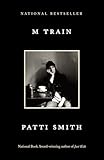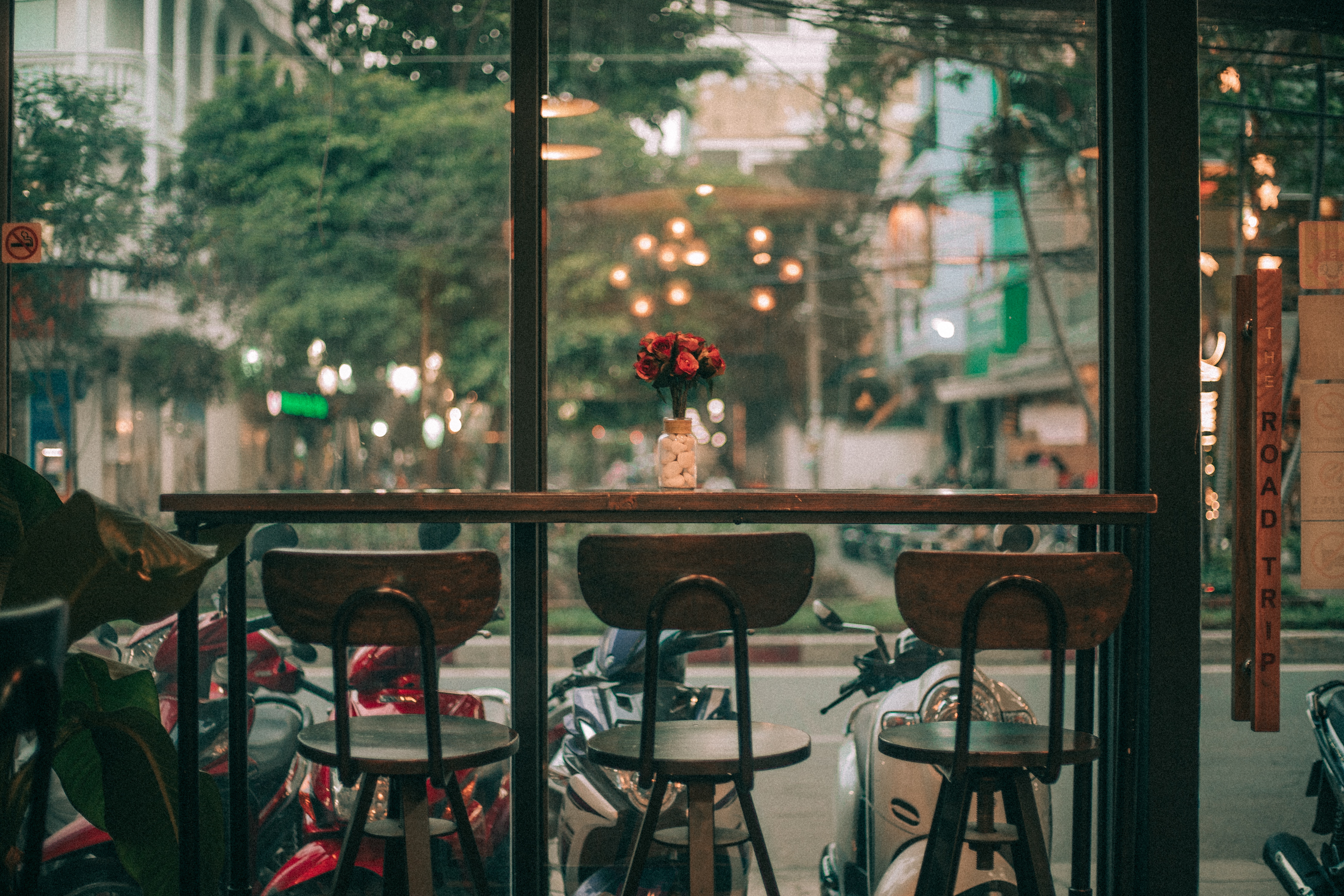Last summer, every day after work I would go to the Boston Public Library courtyard. There I would find a spot where I could read or listen to music and—my true purpose—pass the time during which the MBTA would be unbearably full. After the first couple of days I found one particular chair toward a back corner that I preferred above all others. One day I made it to the BPL slightly later than usual and found someone sitting in my chair. It felt like the universe had betrayed me; the mere presence of this monster (blameless and clueless tourist) was a taunt from the heavens. Or so it felt.
 Great was my relief when I found I was not alone in my petty feelings of ownership over public space. In Patti Smith‘s M Train, her beautiful and sparse memoir on loss—of a husband, of a seaside bungalow, of a chair—she develops and explains the same sense of property over the spaces we frequently frequent. As most scenes within, the book begins with Smith going into her favorite Greenwich Village café (Cafe ‘Ino) for black coffee, toast, and writing. “My table, flanked by the coffee machine and the front window, affords me a sense of privacy, where I withdraw into my own atmosphere.” Whenever we find a corner of the library that appeals to us, or a chair in the train in which we commute every day that has a more comfortable slant or armrest we think of it as “ours.” These places become part of our daily routines in a way that feels deep and personal.
Great was my relief when I found I was not alone in my petty feelings of ownership over public space. In Patti Smith‘s M Train, her beautiful and sparse memoir on loss—of a husband, of a seaside bungalow, of a chair—she develops and explains the same sense of property over the spaces we frequently frequent. As most scenes within, the book begins with Smith going into her favorite Greenwich Village café (Cafe ‘Ino) for black coffee, toast, and writing. “My table, flanked by the coffee machine and the front window, affords me a sense of privacy, where I withdraw into my own atmosphere.” Whenever we find a corner of the library that appeals to us, or a chair in the train in which we commute every day that has a more comfortable slant or armrest we think of it as “ours.” These places become part of our daily routines in a way that feels deep and personal.
 This soft colonization of small territories is an interesting phenomenon. Why and with what right do we dare to think that we can own what is technically for everyone? The answer might be in proxemics and anthropology. Edward T. Hall was an American anthropologist and researcher who studied the way people relate to one another within cities and as social groups, a practice otherwise called “group cohesiveness.” Hall is perhaps better known for developing proxemics, which studies the way humans use space and how this affects the relationships of the population. Proxemics can explain the creation of what we believe to be “our spots.” In his book The Hidden Dimension, Hall defined proxemics as “the interrelated observations and theories of man’s use of space as a specialized elaboration of culture.” It was Edward T. Hall who introduced to us the idea of a personal space—that our physical comfort with strangers decreases as they move from the furthest circles of social space (public space, 12 to 25 feet) into our intimate space circle (six to 18 inches).
This soft colonization of small territories is an interesting phenomenon. Why and with what right do we dare to think that we can own what is technically for everyone? The answer might be in proxemics and anthropology. Edward T. Hall was an American anthropologist and researcher who studied the way people relate to one another within cities and as social groups, a practice otherwise called “group cohesiveness.” Hall is perhaps better known for developing proxemics, which studies the way humans use space and how this affects the relationships of the population. Proxemics can explain the creation of what we believe to be “our spots.” In his book The Hidden Dimension, Hall defined proxemics as “the interrelated observations and theories of man’s use of space as a specialized elaboration of culture.” It was Edward T. Hall who introduced to us the idea of a personal space—that our physical comfort with strangers decreases as they move from the furthest circles of social space (public space, 12 to 25 feet) into our intimate space circle (six to 18 inches).
One of the things we enjoy most about the tables we like in coffee shops or corners in libraries is that they permit us to be alone while also being outside. Sometimes, if a friend comes along we will allow them into what Patti Smith calls our “atmosphere.” But for the most part, although technically public, we have inlaid these tables and chairs with our idle ruminations, our low chuckles at a funny paragraph, perhaps a long sigh or two; for all intents and purposes, they are an extension of our personal space.
 Faces in the Crowd is one of Valeria Luiselli‘s first novels, and in it a young mother remembers her years as a translator living and spending her time in New York. The protagonist moves around the city like a ghost, but every once in awhile she encounters spaces she likes enough to make her own:
Faces in the Crowd is one of Valeria Luiselli‘s first novels, and in it a young mother remembers her years as a translator living and spending her time in New York. The protagonist moves around the city like a ghost, but every once in awhile she encounters spaces she likes enough to make her own:
I had a theory; I’m not sure if it was my own but it worked for me. Public spaces, such as streets and subway stations, became inhabitable as I assigned them some value and imprinted an experience on them. If I recited a snatch of Paterson every time I walked along a certain avenue, eventually that avenue would sound like William Carlos Williams.
We appropriate parts of the outside so that we can feel more comfortable moving within cities that may be large and daunting or small and suffocating. In her essay “Collected Poems” for The New Yorker, Valeria Luiselli talks about her life in New York. Amidst her musings—Luiselli’s writing style is an engaging and motley mix of anecdotes and smart observations—she talks about the people she sees at the library. People she has come to recognize as fellow poachers of selected chairs. She notices the resentment in their eyes when they see their “spot” has been taken and refuse to sit anywhere else:
I have seen them and photographed them, these masters of habit, walking heavily down the central corridors, pretending not to be furious, not to be distraught upon discovering someone else in their spot. I have seen them, looking around the library from inside the rim of their glasses, full of quiet, justified resentment. I’ve also seen them reclaim their spot with an air of entitlement.
Luiselli uses poetry as her tool of choice; Patti Smith, in her trademark spartan style, builds a structure of ownership through the repeated tradition of coffee, writing, and toast. Further into M Train, Smith arrives to Cafe ‘Ino and her table is being used by someone else.
My table in the corner was taken and a petulant possessiveness provoked me to go into the bathroom and wait it out…I left the door unlocked in case someone was in genuine need, waited for about ten minutes and exited just as my table was freed. I wiped off the surface and ordered black coffee, brown toast, and olive oil. I wrote some notes on paper napkins for my forthcoming talk, then sat daydreaming about the angels in Wings of Desire.
In my own case, my sense of possessiveness is more similar to Luiselli’s than Smith’s. My favorite places around the city are the ones that bring forward particular thoughts: the subway stairs where for an inexplicable reason I always think of my favorite journalist or a tiny Chinese restaurant that reminds me of when my parents visited. That chair in the far corner of the public library reminds me of the feeling of peace about the future I felt on that evening where the beginning of summer and the end of my first work day merged. That sort of peacefulness is so rare I feel little remorse in not wanting to share the space that elicits it with anyone else.
Edward T. Hall states that a person’s personal space is carried everywhere they go, as opposed to larger public and social distances, which are negotiated as we attend things like concerts or speeches. I must say that part of the reason favorite public spaces are so personally soothing is precisely because they are not necessarily in my home, the default personal space. There is something calming about crafting a sense of comfort in a place outside of my control. For Patti Smith, “public personal space” eventually integrated with her real personal space, in her home, when Cafe ‘Ino had to close:
–What will happen to the tables and chairs? I asked
–You mean your table and chair?
–Yeah, mostly.
–They’re yours, he said. I´ll bring them over later.
That evening Jason carried them from Bedford Street across Sixth Avenue, the same route I had taken for over a decade. My table and chair from the Café ‘Ino. My portal to where.
Image Credit: Pexels/donghuangmingde.









